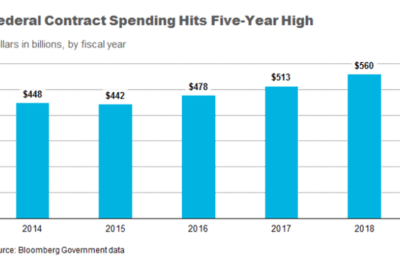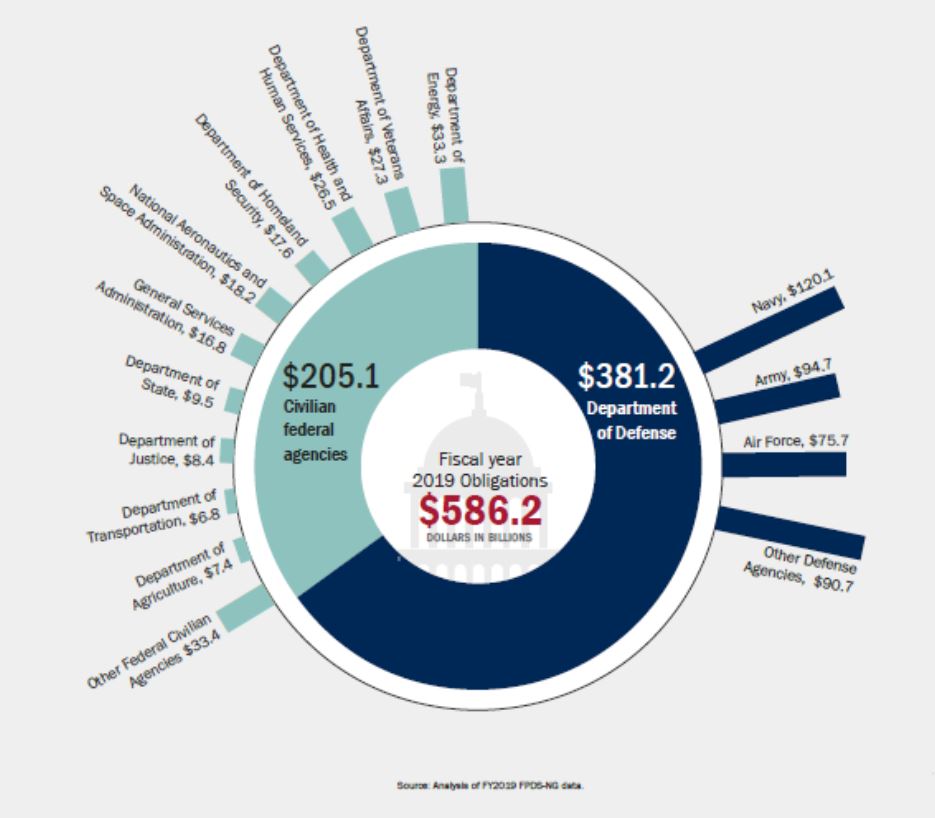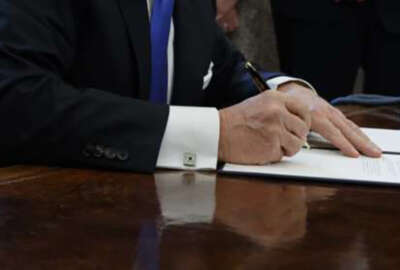 Exclusive
Exclusive  Exclusive
Exclusive The Coalition for Government Procurement wrote a letter to GSA asking how they are going to incorporate the White House executive order and DHS’s report on supply...
Agencies spent more on procurement in fiscal 2019 than in any of the previous 10 years.
And no surprise, agency pending on multiple award contracts for IT and services spiked last year.
Now that all of the 2019 numbers are final, the predictions of a banner year for contractors and agencies when it came to buying products and services came true.
The Government Accountability Office found agencies spent $584 billion on procurement last year, up $20 billion over 2018 and more than $120 billion since 2015.
Bloomberg Government reported that agencies spent $448 billion on procurement in 2014 and a six-year low of $442 billion in 2015.
The Defense Department accounted for $381 billion while civilian agencies spent $205 billion.
Of that, GAO said agencies procured 83.5% of all contracts competitively, up from 64.4% in 2015. DoD continues to struggle with competition as GAO found the Pentagon’s rate dropped to 53.8% in 2019 from 55.4% in 2015.

The majority of contracts continue to be fixed price, while cost reimbursement type contracts make up just under 32% of all deals.
Agencies continue to spend more on services than products across the government with the civilian side seeing almost an $8 billion year-over-year increase and DoD realizing an $11 billion year-over-year increase.
Given the increase in overall spending, it’s no surprise multiple award contracts saw their best years ever.
BGov reported about one of every $4 went through a multiple award contract. The research firm found agencies spent $140 billion in 2019 up from $134 billion in 2018.
Here are some other interesting data points from BGov’s research:
Reminds me of why we need to reform multiple award contracting across the government. Let competition happen at the task order level since agencies are spending more and more money there anyways.
Four months later and the lack of clarity about how President Donald Trump’s executive order, that attempts to crack down on counterfeit products on e-commerce platforms and the General Services Administration’s e-commerce platform effort fit together, remains disconcerting.
There has been no guidance, no details and no public discussions since January when the White House and the Department of Homeland Security outlined the actions agencies should take to protect intellectual property and the supply chain. At the same time, GSA continues to move forward with its proof-of-concept with a goal of making it easier for federal contracting officers to buy commercial products from what some estimate is a $6 billion market.
After a short pause when the coronavirus pandemic emergency started, GSA expects to make an award later this summer to launch the three-year pilot.
This is why the Coalition for Government Procurement is raising these concerns for a second time. After an initial letter to Peter Navarro, the assistant to the president for trade and manufacturing policy, in February, CGP is writing to GSA asking for more clarity.
Read more: Contracting News
“Coalition member concerns included the inappropriate access to, and use of, platform supplier transactional and other proprietary data and the risk giving inordinate market power of platform providers by placing them in the position of gate keepers to the federal marketplace,” wrote Tom Sisti, executive vice president and general counsel at CGP, in the May 22 letter to Laura Stanton, GSA’s acting assistant commissioner for category management. “Further, the Coalition expressed concerns that the absence of a requirement for platform providers to identify accurately the country of origin of products offered for sale on their platforms, coupled with the failure to hold platform providers accountable for compliance with the Trade Agreements Act (TAA), risked subjecting the government market and government systems to products of unknown integrity.”
Sisti said it is clear that there are several contradictions between the e-marketplace acquisition and DHS recommendations, which the agency released shortly before the president signed the executive order in January. In the letter, CGP outlines at least nine of these contradictions, including:
“[W]e ask whether and how the e-marketplace solicitation will be amended to include specific requirements that address each of the best practices identified in the report,” Sisti wrote. “While the latest version of the solicitation asks that e-marketplace platform providers describe their commercial practices in many of these areas, we do not find that this approach is sufficient to protect federal buyers from purchasing counterfeit and gray market products. [T]hese best practices have not been addressed in the current solicitation, and thus, in the interest of maintaining the integrity of the contracting process, the Coalition believes that the changes should be released for public comment, and the solicitation timeframe amended accordingly.”
GSA already amended the solicitation at least once. The question is whether it’s too late in the process as it gets closer to award to amend it again.
Either way, CGP’s concerns about the differing paths of the White House and GSA must be addressed if the e-marketplace initiative is to have any impact to solve the problems lawmakers believe existed.
Copyright © 2025 Federal News Network. All rights reserved. This website is not intended for users located within the European Economic Area.
Jason Miller is executive editor of Federal News Network and directs news coverage on the people, policy and programs of the federal government.
Follow @jmillerWFED
 Exclusive
Exclusive 


